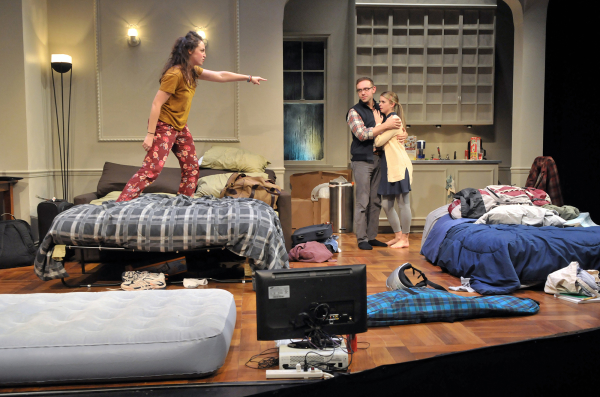Bad Jews

(© Craig Bailey)
The term "bad Jew" is frequently self-assumed by someone who is Jewish, as in "I didn't go to High Holiday services, so I'm a bad Jew," or "I let my son skip Hebrew School for a soccer game," and others variations of guilt. However, in this world of loaded political expressions and seething hatreds, not to mention the practice of casual anti-Semitism without understanding the consequences, some local viewers were scared away by the title of Joshua Harmon's otherwise smart play, Bad Jews. SpeakEasy Stage is presenting the New England premiere at Boston Center for the Arts.
Harmon's 90-minute screed about two cousins battling over a tangible memento of their late, beloved "Poppy" is as much about the universal ties that bind or unravel in families — no matter their ethnicity or religion — as it is about a specific constituency. While the combat lines are real and visceral, the script is loaded with laughs as well as venom.
Three cousins come together on the night of their grandfather's funeral in a claustrophobic, Upper West Side studio apartment that is shoehorned onto the stage by designer Eric Levenson. Diana, who calls herself Daphna, plans to move to Israel after she graduates from Vassar. Liam, Daphna's cousin, is a graduate student at the University of Chicago where he is studying "Japanese Youth Culture." Liam is an assimilated Jew, just back from a ski trip to Aspen. His brother, Jonah, also a college student, keeps to the corners, not wanting to join the fray. The trio is joined by Melody, Liam's blond, blue-eyed shiksa girlfriend. In an act of total cluelessness, Liam has brought her to meet the family while they are in mourning.
The conflict, which has clearly been simmering since their shared childhood, is between Daphna and Liam. She feels that she is the proper inheritor of the golden "chai" on a chain, which Poppy carried under his tongue for two years while he was a prisoner in a Nazi concentration camp during World War II. Liam lays claim to the symbolic ornament because Poppy gave it to their grandmother when he proposed marriage as Liam intends with Melody. When Daphna discovers what Liam has planned, she is further incensed. As for Jonah, he repeats his "I don't want to get involved" mantra whenever they try to put him in the middle. The chronology of insults between Daphna and Liam escalates to include Melody, who might be the only sane person, begging the others for civility.
Under the direction of Rebecca Bradshaw, a relative newcomer to the Boston theater scene, the situation unravels in appropriate fits and starts as the two main opponents, Daphna and Liam, come out swinging, then take timeouts to lick their wounds and assemble the comebacks. Although the play is well-cast, the problem is one of scale. The characters of Daphna, played by the hyper-charged Alison McCartan, and Liam, portrayed by local actor Victor Shopov, who is more impressive with every new role, are both unappealing and unlikable. McCartan chews the scenery at the thought of Liam's arrival; Liam must cool himself down before he opens the door to the apartment where Daphna lies in wait for him. Bradshaw might have modulated their performances to some sort of build, rather than starting them at fever pitch.
However, Shopov gets points for his delivery of a manic monologue while standing on top of the sofa bed. McCartan matches his intensity in her long rebuttal. Gillian Mariner as Melody has her virtuoso turn when she sings — off-key, don't ask — "Summertime" to cool Daphna down. And Alex Marz as Jonah proves that it's the quiet one to be watched.
The one wrong note in Harmon's otherwise savvy script are words he's put in Daphna's mouth: "Now when it's easiest to be Jewish, when it's safe, you want to stop," a statement that could well be disputed by anyone who reads the newspapers. Nonetheless, the SpeakEasy Stage production deserves to be seen for the ensemble acting, the playwright who took a common expression and made it stand for a family in disarray, and a director who wrestled these incendiary relationships onto the stage.











